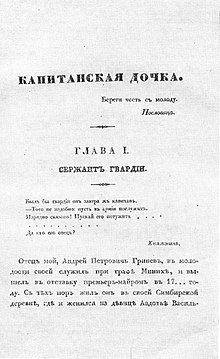
-
Published: 11 January 2023

12-Jn.-2023
Written by | Alexander Yanixana
Alexander Sergeyevich Pushkin was a Russian poet, playwriter, and novelist of the Romantic era.
He is considered one of the greatest Russian poets and the founder of modern Russian literature. Pushkin was born into the Russian nobility in Moscow.
Pushkin was born into the Russian nobility in Moscow.[9] His father, Sergey Lvovich Pushkin, belonged to an old noble family. His maternal great-grandfather was Major-General Abram Petrovich Gannibal, a nobleman of African origin who was kidnapped from his homeland and raised in the Emperor's court household as his godson.
He published his first poem at the age of 15 and was widely recognized by the literary establishment by the time of his graduation from the Tsarskoye Selo Lyceum. Upon graduation from the Lycée, Pushkin recited his controversial poem "Ode to Liberty", one of several that led to his exile by Emperor Alexander I. While under the strict surveillance of the Emperor's political police and unable to publish, Pushkin wrote his most famous play, Boris Godunov. His novel in verse, Eugene Onegin, was serialized between 1825 and 1832. Pushkin was fatally wounded in a duel with his wife's alleged lover and her sister's husband, Georges-Charles de Heeckeren d'Anthès, also known as Dantes-Gekkern, a French officer serving with the Chevalier Guard Regiment.
one of his works that we are interested in today to talk about is The Captain's Daughter, which is a historical novel by the Russian writer Alexander Pushkin. It was first published in 1836 in the fourth issue of the literary journal Sovremennik. The novel is a romanticized account of Pugachev's Rebellion in 1773–1774. The title "The Captain's Daughter" has also been used to refer to a collection of stories, one of which was the actual novel.

plot|
Pyotr Andreyich Grinyov (the narrative is conducted on his behalf) is the only surviving child of a retired Imperial Army officer. When Pyotr turns 17, his father sends him into military service in Orenburg. While en route, Pyotr gets lost in a blizzard but is rescued by a mysterious man. As a token of his gratitude, Pyotr gives the guide his hareskin coat.
Arriving in Orenburg, Pyotr reports to his commanding officer and is assigned to serve at Fort Belogorsky under Captain Ivan Mironov. The "fort" is little more than a fence around a village, and the captain's wife Vasilisa is really in charge. Pyotr befriends his fellow officer Shvabrin, who has been banished here after a duel resulted in the death of his opponent. When Pyotr dines with the Mironov family, he meets their daughter Masha and falls in love with her. This causes a rift between Pyotr and Shvabrin, who has been turned down by Masha. When Shvabrin insults Masha's honor, Pyotr and Shvabrin duel, and Pyotr is injured. Pyotr asks for his father's consent to marry Masha, but is refused.
Not much later, the fortress is besieged by the insurgent Yemelyan Pugachev, who claims to be Emperor Peter III. The Cossacks stationed at the fortress defect to the forces of Pugachev, and he takes the fortress easily. He demands that Captain Mironov swear an oath of allegiance to him, and when refused, hangs the Captain and kills his wife. When it is Pyotr's turn, Shvabrin suddenly appears to have defected as well, and upon his advice Pugachev orders Pyotr to be hanged. However, his life is suddenly spared as Pugachev turns out to be the guide who rescued Pyotr from the blizzard, and he recognizes Pyotr whom he remembers with affection.
The next evening, Pyotr and Pugachev talk in private. Pyotr impresses Pugachev with the sincerity of his insistence that he cannot serve him. Pugachev decides to let Pyotr go to Orenburg. He is to relay a message to the Governor that Pugachev will be marching on his city. The fort is to be left under the command of Shvabrin, who takes advantage of the situation to try to compel Masha to marry him. Pyotr rushes off to prevent this marriage
but is captured by Pugachev's troops. After explaining the situation to Pugachev, they both ride off to the fortress.
After Masha is freed, she and Pyotr take off to his father's estate, but they are intercepted by Imperial troops. Pyotr decides to stay with the army and sends Masha to his father. The war with Pugachev goes on and Pyotr rejoins the army. At the moment of Pugachev's defeat, Pyotr is arrested for having friendly relations with Pugachev. During his interrogation, Shvabrin testifies that Pyotr is a traitor. Not willing to drag Masha into court, Pyotr is unable to repudiate this accusation and receives the death penalty. Although Empress Catherine the Great commutes his death sentence, Pyotr remains a prisoner.
Masha understands why Pyotr wasn't able to defend himself and decides to go to St. Petersburg, to present a petition to the empress. In Tsarskoye Selo, she meets a lady of the court and details her plan to see the Empress on Pyotr's behalf. The lady refuses at first, saying that Pyotr is a traitor, but Masha is able to explain all the circumstances. Soon, Masha receives an invitation to see the Empress and is shocked to recognize her as the lady she had talked to earlier. The Empress has become convinced of Pyotr's innocence and has ordered his release. Pyotr witnesses the beheading of Pugachev. He and Masha are married.
